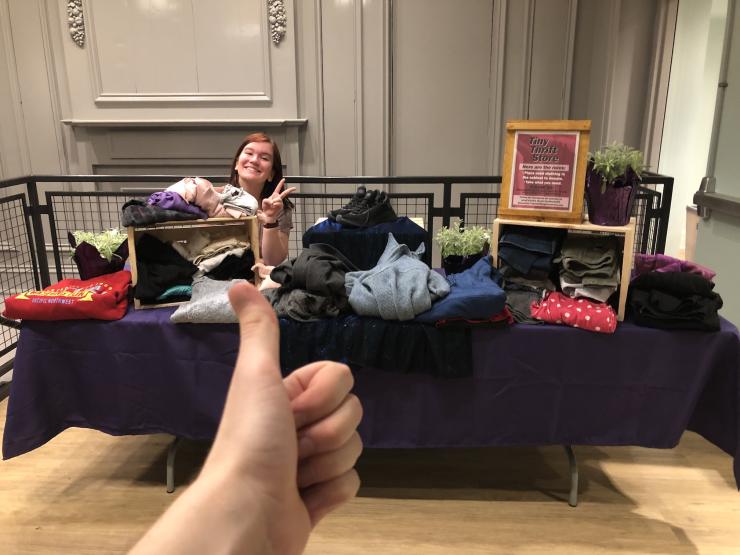Upcycle, BYOC, Compost, and Recycle. Environmentalists throw a lot of terms around, but the goal remains the same: divert as much as possible from the trash stream. Emerson employs multiple strategies and engages the entire community to progress toward a zero-waste campus. It starts with refusing what it does not need and reducing what it does need. The College strives to reuse or repurpose what it consumes and utilizes recycling and composting as a last option. Use the Waste Guide below to help Emerson strive towards zero-waste!
Campus Waste Sorting Guide
Looking for a quick overview of what goes in what bin? Check out the information below.
Recycling
Emerson contracts with Waste Management to make recycling easy. Our recycling is zero-sort. Everything goes in one bin. Once collected, Emerson’s recyclables get processed throughout the United States into usable material. This usable material becomes new items such as new glass bottles, T-shirts, and newspapers. Neither Emerson nor Waste Management sorts recyclables out of the trash. Therefore, Emersonians need to work together to ensure their waste gets into the appropriate bin.
You can recycle:
- Laundry detergent containers
- Cardboard/Cardboard boxes (flatten first)
- Aluminum cans
- Glass, including bottles
- Metal
- Plastic coffee lids
- Paper mailers
- Paper
- Plastic
You cannot recycle:
- Foods or liquids
- Plastic bags
- Soiled paper
Compost
Waste Management collects our organic waste and brings it to a process facility in Boston. The waste is broken down using anaerobic digestion, which produces renewable energy.
You can compost:
- Food scraps
- Paper products
- Plant matter
- Dirty paper/Cardboard food containers
- Compostable cups
- Paper straws
- Fruit and vegetable scraps
- Meat scraps
- Dairy products and eggs
- Paper napkins (new or used)
- Wooden stir sticks
- Ice cream bowls
You cannot compost stickers.
Trash
Emerson’s trash is incinerated by Waste Management. When our bins of recycling and compost are contaminated, they must be added to the trash as well.
Throw these items in the trash:
- Plastic bags
- Candy/Protein bar wrappers
- Black plastic (e.g., takeout containers)
- Plastic utensils
- Chips bags
- Non-compostable beverage cups
- Styrofoam containers
- Plastic straws
- Plastic mailers
Do not throw out compostable items or recyclables.
Other Items
Looking to get rid of anything else? Refer to the list below to find where it goes! If you can’t find the item you’re looking for, please contact sustainability [at] emerson.edu (sustainability[at]emerson[dot]edu).
K-Cup Recycling
K-Cups combine organic material and recyclable materials, making them a challenge to recycle. While it’s more environmentally friendly to skip K-Cups, Emerson recognizes that its community uses them daily. The College participates in the Grounds to Grow On program to divert Emerson K-Cups from incineration. Find a collection box in over 19 participating campus offices.
Batteries and Bulbs
Batteries are collected for recycling in designated clear cylinder bins found in the lobbies of each residence hall. Look for the wall poster and the distinctive box. The Campus Services team safely recycles bulbs. Please put in a work order to have your lightbulbs collected by using your ECNet username and password. (This is the same place you submit a work order when you have a problem with your room or office.)
E-Waste
The IT Help Desk supports e-waste (also known as electronic equipment) recycling at Emerson. Please bring computers, monitors, printers, electronics, and cell phones to the IT Help Desk (located on the fourth floor of the Walker Building) to have them safely discarded.
Medicine
Anyone in the Emerson community can anonymously and confidentially dispose of unused, expired, and unwanted prescription drugs and over-the-counter medications, free of charge, 24/7 in the hallway at 114 Boylston Street.
Textiles
Every year, 21 billion pounds of textiles are thrown away in the United States. 45% of these textiles can be reused, 30% can be turned into wiping cloths, and 20% can be recycled into new products. Any community member can drop off clothing, shoes, towels, linens, and pillows at the white Bay State Textile collection box in Allen's Alley.
Toner/Ink
Emerson recycles both toner and ink cartridges through WB Mason. WB Mason accepts empty cartridges upon delivery, free of charge and without notice. Alternatively, Emersonians can fill out this Google Form for pick up by Emerson Sustainability or email sustainability [at] emerson.edu to request a recycling collection box for their office.
Paper Shredding
Throughout campus, secure gray toters collect paper for shredding. Emerson’s vendor shreds paper offsite and recycles the shreds by turning it into pulp.
Griff Gives
During move-out, Emerson provides collection zones in each residence hall for students to donate unwanted clothing, household supplies, books, and unopened food. These donations are given to on-campus partners like Student Success and several local nonprofit organizations. Keep a lookout for information on how to get involved and donate.
Clean Out Your Office Day
Staff and faculty sometimes overbuy office supplies or no longer use certain items, such as books, gently used decor, and paper reams. The Clean Out Your Office Day promotes sharing resources by creating an environment where individuals can donate and take office supplies, books, and office decor. Anything left over goes to local nonprofit organizations or gets recycled.
Nonperishable Food
The Office of Student Success oversees Emerson’s food pantry, where individuals may donate nonperishable food throughout the year. Similarly, everything is free and available to members of the Emerson community in need. Reduce Emerson’s environmental footprint while helping a peer? Win-win!
Free Food
Students, faculty, and staff can join the #freefood Slack channel to hear about leftover food on campus. Community members are also encouraged to send photos and locations of leftover food they see at events to one or both of these channels.



